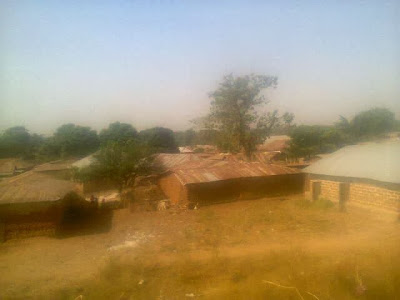GIDINYE, Nasarawa, Nigeria – The day started like any other, but what happened that November day five years ago will stay with me forever.
 From the cock’s crow in the early hours to the usual hustling and bustling that characterize the little town of Agyaragu, things seemed normal. Farmers took to their farms, petty traders to their stalls and children to school. Everyone went about their daily duties.
From the cock’s crow in the early hours to the usual hustling and bustling that characterize the little town of Agyaragu, things seemed normal. Farmers took to their farms, petty traders to their stalls and children to school. Everyone went about their daily duties.
I was not an exception. I went to my family’s roadside stall in the morning to make some sales. About an hour later, I heard shouts. At first, I thought a traditional ceremony was going on, or that a group of youth were just excited about something.
After some time, the shouts intensified. This time, it was a mixture of voices – mothers, children and some youth. They all ran towards the road, which was gradually filling with people. With their babies strapped to their backs, mothers scampered for safety. Everyone was running for their lives. Something was terribly wrong.
Along the rest of my family who were helping me at our stall, I ran to the other side of the road, which was safer at that moment. A little while later, there was fire everywhere. From afar, I watched as the blaze consumed beautifully adorned houses, its flames building castles in the air.
When we had a chance to get a taxi and leave for Lafia, the state capital, we did. We stayed away for three days, waiting for the dust to settle before we returned.
What began like a mere feud between neighboring communities had snowballed into violence of unimaginable proportion. Lives were lost. Graveyard silence pervaded the community.
I lost some friends to the clash, too, young people who had very bright futures. When I heard the news, I could not hold back tears. I wondered why the two sides would be locked in such a violent clash, given that they had lived together for a good number of years. Some of them had even married each other. It was that close.
Today, Gidinye lies in ruins. On entry into the community, burnt houses and property greet you. Most families can hardly afford a square meal per day. The standard of living, to put it mildly, is poor.
Most children have dropped out of school because their parents are not able to afford their school fees again. They now roam the streets from morning till the evening hours, when they retire back home to have some rest before the next morning comes calling.
Some youth no longer have a source of livelihood. As a result, they have taken to drinking and smoking. For them, it is probably a way of burying the sad memories of November 25th. Some of them have taken to robbery as a means of survival.
The conflict did not only affect the serenity of Gidinye but also that of the entire Agyaragu, the suburb in Nasarawa state that includes the village. In a town that once bubbled with activities, businesses have stopped booming and many business owners have had to relocate.
The horror of Nov. 25, 2012 will remain eternally etched on the minds of the people of Gidinye. Generations to come will hear the story of how their once-sleepy community was reduced to rubble by their foes.
Gideon Arinze Chijioke is a Senior Reporter with Youth Journalism International.
If you want to read more about the attack on this village, see this accompanying story by Gideon Arinze Chijioke and also read this 2014 story by Linus Okechukwu.



